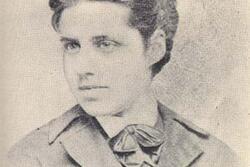Lifting Our Lamp to Welcome the Stranger
My paternal grandparents, both children of Holocaust survivors, immigrated to the United States through New York. My grandmother arrived in the mid-1950s. In an interview last year, I was able to capture some of her reflections on the experience of traveling to America by ship. She recalled the boat ride as stormy and scary; even now, she loves Coca-Cola, which was the one thing she could keep down when she was feeling nauseous en route.
She also recalled the powerful moment when she first spotted the Statue of Liberty as she entered New York’s harbor. She recounted it to me, as if transported back to her 11-year-old self again, gazing on the United States for the first time: “It was early in the morning and everyone on the boat came out to see it; it was very moving. This huge statue came into view—it was amazing. Overwhelming, awe-inspiring, people were crying.”
Together we recited the famous lines inscribed on the Statue’s base:
“Give me your tired, your poor,
Your huddled masses yearning to breathe free,
The wretched refuse of your teeming shore.
Send these, the homeless, tempest-tost to me,
I lift my lamp beside the golden door!”
“Good, good,” she nodded approvingly, happy that I knew Emma Lazarus’ words that have been so impactful on her life.
Emma Lazarus’ poem “The New Colossus” (1883), is cast on a bronze plaque that sits on the base of the Statue of Liberty. Its text is directed towards immigrants coming to the United States and speaks towards their (hopeful) acceptance and safety in their new country, and how immigration contributes to a vision for a better future. Lazarus herself was a New York-born Jewish author, poet, and activist.
Learning about her important work aiding Eastern European refugees fleeing from discrimination, violence, and pogroms inspired me to think more deeply about immigration: both its connection to my own life and to today’s world. Although Lazarus’ poem is not explicitly Jewish in nature -- as it is intended for a broad American audience -- in her words, I hear echoes of Jewish values such as chesed (lovingkindness), hachnasat orchim (welcoming the stranger), generosity, and caring for the “other.” Again and again, in the Book of Exodus and beyond, the Torah calls on us to take care of those least advantaged—the orphans, widows, and strangers—and to extend that same ethos of concern to all. Emma Lazarus certainly seems to have been informed by these Jewish values when she composed her most famous poem. To me, “The New Colossus” demonstrates the extent to which Jewish and American values align and overlap.
Today, it feels like our country is sliding backwards. Instead of welcoming immigrants with open arms and an attitude of warm acceptance (which was clearly Lazarus’ hope, even if it didn’t reflect the true social reality of her time), newcomers to the U.S. now arrive to a large dose of skepticism and disdain. Contemporary American political discourse features strong nativist rhetoric, and immigrants face tangible threats like detention centers and deportation.
Emma Lazarus had no illusions that the immigrants of her day were well-connected or well-resourced. On the contrary, she talks about the “tired,” “poor,” and “huddled masses yearning to breathe free.” In her era, many other Jews from backgrounds like her own (she was of both western Sephardi and German descent, and her family had already been in America for some time) were actually not so open and welcoming to the throngs of Eastern European Jews who had begun to arrive in the early 1880s: they saw them as backwards and an embarrassment. Through her powerful poetry, Lazarus worked hard to expand the hearts and minds of those around her. Her writing expresses her belief that here in America, even the “wretched refuse” of the world can find security and assimilate into society in ways that could benefit both themselves and the country as a whole.
Emma Lazarus’ vision of a more welcoming society and her belief in a better future seem to directly contradict today’s dramatic rise in xenophobia and fearmongering. We see this today through calls to “build a wall” or policies like de-naturalization and mass deportation.
As a country, it is imperative that we continue to read and reflect on Lazarus’ words. To take them seriously would mean becoming more generous and welcoming as a society, in alignment with both American and Jewish core values. With our country seemingly regressing on the issue of immigration, it can be easy to believe that our attempts at activism do not make a difference. We must learn from Emma Lazarus, who advocated and pushed on behalf of immigrants in her day, even when it wasn’t easy.
During her lifetime, Emma Lazarus never actually got to see her words inscribed on the Statue of Liberty’s base; clearly, she cannot have known the impact she had on future generations. If only she could have seen me sitting in a restaurant with my grandmother, interviewing her about her immigration experience and watching her tear up talking about the Statue of Liberty and the power of Lazarus’ poem. We, too, must continue advocating for and writing about the future we hope for, even if it takes many years.
This piece was written as part of JWA’s Rising Voices Fellowship.






